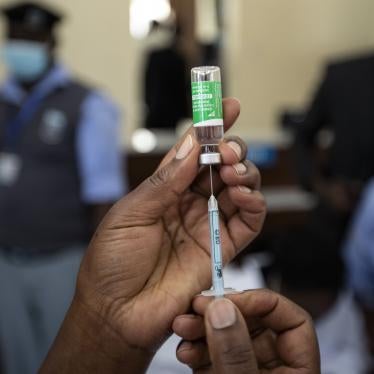The rollout of Covid-19 vaccines has finally begun in several African countries, bringing to the fore another challenge connected with the pandemic – vaccine hesitancy.
If not addressed, some people’s reluctance to be vaccinated and misinformation will severely undermine the effectiveness of Africa’s response. Upholding people’s right of access to information, and community engagement and involvement would undoubtedly increase trust in government institutions and messaging.
Some African governments already have strategies to overcome vaccine hesitancy and build public confidence in Covid-19 vaccines. In South Africa, President Cyril Ramaphosa publicly took a jab of the Johnson and Johnson vaccine last month, and in Zimbabwe, Vice-President Constantino Chiwenga was the first person to publicly receive a dose of the Sinopharm vaccine. On January 10, the President of Seychelles, Wavel Ramkalawan, said he would be the first to receive a shot to boost public trust in the safety of the vaccines. Guinean cabinet members and other government officials were shown on television receiving their first doses of the vaccine.
The approach hasn’t been positive or helpful across board though. In just one example, in January Tanzanian President John Magufuli openly rejected Covid-19 vaccines and spread false information with claims that prayers and steam inhalation offered better protection. And some leaders have resorted to threats to press acceptance of the Covid-19 vaccines. Zimbabwe President Emmerson Mnangagwa last month warned the public that those refusing to take vaccine might be denied jobs and public services.
In contrast, to boost public trust, South African president Ramaphosa has repeatedly insisted that vaccines are voluntary and not mandatory. Coercing people into vaccination against their will, including through making vaccination a condition for free movement, employment, or accessing education or services without reasonable accommodations for those who cannot or choose not to get vaccinated will most likely undermine public trust.
Beyond the public vaccine jabs by government leaders, it is essential for African governments to engage in robust outreach to communities that are hesitant to use Covid-19 vaccines and to take steps to build public confidence in vaccines by collaborating with community leaders. Governments are responsible for providing information necessary for the protection and promotion of rights, including the right to health. Upholding the right of unhindered access to information is key to overcome vaccine hesitancy and to counter misinformation and mistrust, some of which are rooted in cultural stigma and taboos.
A rights-respecting response to Covid-19 needs to ensure that accurate and up-to-date information about the virus, vaccines, access to services, service disruptions, and other aspects of the response to the outbreak is readily available and accessible to all. Health authorities should provide regular health information briefings and public service announcements aim to counter misinformation, help calm panic, restore public confidence, and encourage people’s assistance in the crisis.
Information about Covid-19 vaccines should be accessible and available in multiple languages, including for those with low or no literacy. This should include qualified sign language interpretation for televised announcements; websites that are accessible to people with vision, hearing, learning, and other disabilities; and telephone-based services that have text capabilities for people who are deaf or hard of hearing. Communication materials should utilize plain language to maximize understanding.
The authorities should ensure reliable, affordable and unfettered access to the internet, including for people with low incomes. Further steps could be taken to end internet shutdowns, lift data caps, upgrade speeds, and eliminate eligibility requirements for any low-income-targeted plans during the pandemic.
In addition, government should pay special attention to community-based approaches to raise awareness and dispel myths for people to change their behavior. This is critical as past experiences in public health crisis response show that sustained behavior change over a long period depends on strong partnerships between all stakeholders, in particular women, religious leaders and local artists.
Community health systems can also monitor for potential adverse events from vaccination. Without a system in place to respond immediately and investigate such reports, unfounded rumors can form as a result of unrelated illness or death in people who have been vaccinated. Failing to address such events will strengthen vaccine hesitancy and undermine vaccination efforts. Developing strong ties to communities, and community leaders, can also help increase accountability – if, for example, vaccines are mishandled or distributed in ways that contradict priority criteria.
In April 2020, the African Commission on Human and Peoples’ Rights’ special rapporteur on freedom of expression and access to information in Africa reiterated that governments’ duties during the pandemic include ensuring that members of the public receive accurate, regular, accessible and science-based information on Covid-19. A month earlier, the commission’s chairperson had highlighted the role of community leaders, the media, and opinion leaders in mobilizing the public to heed the scientific advice and requirements of the prevention and containment measures.
If African governments are to roll out successful Covid-19 vaccine strategies, they need to tackle vaccine hesitancy through unhindered access to information and creative collaboration with community leaders, including women and youth grassroots movements. These strategies, including use of positive messaging, storytelling, and drama, are essential for enabling people to be vaccinated safely and without fear.








